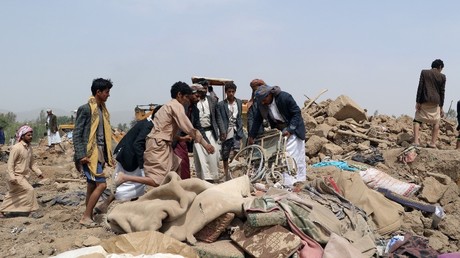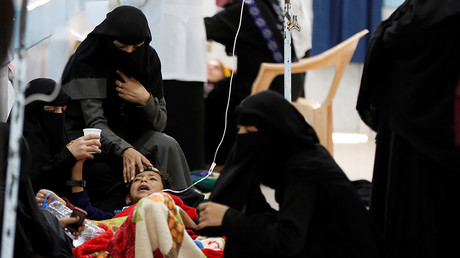“What we notice is this very disturbing trend for the past months in which belligerents seem not to make the difference between the military targets and civilian targets,” Iolanda Jaquemet, an ICRC spokesperson for the Middle East, told RT on Tuesday.
The Red Cross has reached out to other countries that have “a stake in this conflict,” who are also signatories to the 1949 Geneva Conventions – a basic international legal document protecting civilians during wartime, Jaquemet stressed.
The ICRC has reminded governments supporting warring factions in Yemen that their “protégés must respect the Geneva Conventions and the law of armed conflict,” in the hope that “little by little their behavior will change.”
She remarked that “parties at war should do their utmost to make sure that they’re targeting legitimate military objectives and not civilians’ homes or markets.”
The ICRC official was speaking several days after an alleged airstrike by Saudi-led coalition forces killed six children and three women, said to be members of one family, in the Mahda district on the south-western outskirts of Saada city in Yemen.
The area, a stronghold of Iran-backed Shiite Houthi militants, has previously been targeted by the coalition. In June, at least 25 people were reportedly killed at the al-Mashnaq market in Saada province, in what was said to be another Saudi-led coalition bombing.
“What we’ve seen though is several incidents – tragic incidents – during which scores of civilians were killed,” Jaquemet said. “There was such an incident in June in the governorate of Saada again … and indeed, this last one that wiped out almost an entire family on Friday – again, near the city of Saada.”
The ICRC, however, has not singled out any particular side of the conflict, saying that “not enough precautions are being made by various parties.”
The ICRC will keep raising these issues while “doing our bilateral confidential dialogue with all the parties,” Jaquemet added.
Speaking of the mass cholera outbreak in Yemen, she said that “over 460,000 suspected cases, close to 2,000 dead, is the largest of such epidemics of our time … which has direct consequences also of the conflict and of the way this conflict is being waged.”
Recently, ICRC President Peter Maurer said in a statement that up to 600,000 Yemenis may be exposed to cholera by the end of the year as the rainy season is fast approaching.
“This outbreak is manmade,” Maurer stressed. “It is a direct consequence of more than two years of warfare. The healthcare system has collapsed, with people dying from easily-treatable chronic diseases. Key services like garbage disposal have ceased to function, as I saw all too clearly in Taiz.”
Despite international calls to alleviate human suffering in Yemen, civilians continue to bear the brunt of war. The UN estimated in early August that around 70 percent of Yemenis are in urgent need of humanitarian aid.
Roughly 60 percent have no prospects of securing their next meal as nearly 7 million “are close to slipping into a state of famine,” Auke Lootsma, UN Development Programme (UNDP) country director, said.
“Yemenis are resilient people, but how much more must they resist? We have seen, in Syria and elsewhere, how two years of conflict turns into six, 10. Yemen’s fate can be different, but I see few signs of hope,” the ICRC president said.
Source Article from https://www.rt.com/news/399069-red-cross-yemen-civilians-killed/?utm_source=rss&utm_medium=rss&utm_campaign=RSS
Related posts:
Views: 0
 RSS Feed
RSS Feed

















 August 9th, 2017
August 9th, 2017  Awake Goy
Awake Goy 

 Posted in
Posted in  Tags:
Tags: 
















